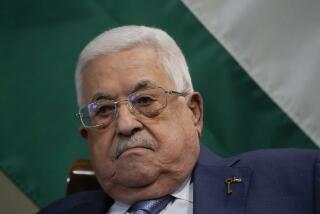Pakistan’s incoming prime minister turns pragmatic
ISLAMABAD, Pakistan — After a resounding victory in Pakistan’s national elections, presumptive new Prime Minister Nawaz Sharif could have pressed his populist, hard-line approach that paints the U.S. as hopelessly malevolent and self-interested.
Instead, Sharif, who served as prime minister in the 1990s, and his top aides have tried during the last few days to ensure that Washington does not feel alienated by his return to power.
Sharif’s team has denounced claims by critics who call him soft on militants and emphasized that the tension between Pakistan and the United States tied to American drone strikes and other issues cannot be resolved through threats and condemnation.
“He wants to solve it through negotiations and talks,” said Sen. Tariq Azeem, a member of Sharif’s Pakistan Muslim League-N Party and a top Sharif advisor. “We know for sure that drone attacks have not helped [stem militant violence] to a degree that people have hoped. So a slight change of policy, he thinks, probably would help.”
A key theme in postelection remarks has been the importance of changing the widespread belief that Sharif has tolerated extremist groups and at times welcomed their political support.
“We will have to take a tough line against anyone involved in terrorism,” Azeem said. “He’s very vocal on that. Terrorism has cost us a lot in terms of investment and our economy.”
The approach reflects a Sharif different from the prime minister who in 1998 defied the U.S. and launched Pakistan’s first nuclear missile tests. Washington retaliated with sanctions that froze international aid and loans to Pakistan, dealing a severe blow to the country’s economy.
Now 63, Sharif has evolved into a pragmatic leader who realizes that despite the intense anti-American sentiment pervading Pakistani society, his country needs a robust partnership with Washington. Pakistan remains heavily dependent on the international community to prop up its economy. Washington, in turn, needs Pakistan’s help in bringing Afghan Taliban leaders to peace talks aimed at ending 12 years of war in Afghanistan and its cooperation in battling Islamist militants using Pakistan as a training ground.
Sharif, who was prime minister from 1990 to 1993 and from 1997 to 1999, handily defeated former cricket star turned politician Imran Khan and his Movement for Justice and President Asif Ali Zardari’s Pakistan People’s Party in parliamentary elections Saturday. He has now begun to form his new government.
A caretaker administration will continue to govern the country while Sharif shapes his Cabinet. His party’s margin of victory and wins by independent candidates will allow him to control the parliament without having to craft a coalition government.
Sharif nevertheless visited Khan, who is recovering from back injuries suffered in a fall during the campaign, at a Lahore hospital Tuesday. Khan’s party won the third-largest share of parliamentary seats.
“We don’t have any personal rivalry,” Sharif told reporters. “Pakistan is in trouble, and we should work together to give a better Pakistan to next generations.”
One of Sharif’s biggest challenges will be the threat posed by the Pakistani Taliban, the homegrown insurgent group responsible for waves of suicide bombings and other terrorism that has killed thousands of Pakistanis in recent years. The group is also a major worry for the U.S.: The bombing attempt in New York’s Times Square in 2010 was carried out by a Pakistani American who received training and financial support from the Pakistani Taliban.
In recent years, Sharif has been an ardent proponent of dialogue with militant groups, including the Pakistani Taliban. However, his aides say he would not shy away from using government forces to crack down on militants if negotiations failed or if insurgents reneged on promises to lay down their arms.
Security analyst Talat Masood, a retired Pakistani general, said Sharif’s pledge to investigate whether the nation’s premier intelligence agency, Inter-Services Intelligence, played a role in the 2008 attacks in Mumbai, India, that killed more than 160 people was “somewhat heartening.” Indian authorities have alleged ISI involvement, a charge that Pakistan’s security establishment has strongly denied.
Masood said Sharif also could apply pressure to Sunni militants responsible for attacks on Pakistan’s Shiite minority community, which have killed hundreds. One of those groups, Lashkar-e-Jhangvi, has operated relatively freely in the southern province of Baluchistan and in southern Punjab, the province that Sharif’s party has governed for five years.
“He should make a statement by going after” Lashkar-e-Jhangvi, Masood said. “Otherwise the Shia community won’t have confidence in him, and neither will other minorities or the international community.”
A wild card for Sharif is the emergence of Khan, whose party will probably head a coalition government running the volatile northwestern province of Khyber-Pakhtunkhwa, where the Pakistani Taliban and an array of other militant groups maintain strongholds along the Afghan border.
Sharif could meet resistance from Khan — who was stridently anti-U.S. in his campaigning — on issues that require U.S.-Pakistani cooperation, including the pursuit of Afghan Taliban militants in tribal regions along the border and the use of Pakistan as a transit route as the U.S. completes its withdrawal of most combat troops from Afghanistan by the end of 2014.
“If Khan tries to pursue a policy which is at a tangent to what Sharif is doing or what the army wants,” Masood said, “then we will have serious problems.”
More to Read
Start your day right
Sign up for Essential California for news, features and recommendations from the L.A. Times and beyond in your inbox six days a week.
You may occasionally receive promotional content from the Los Angeles Times.






